- Details
- Category: Senator Kimberly A. Lightford News
 BROOKFIELD –Senate Majority Leader Kimberly A. Lightford (D-Maywood) held her 11th Annual Back-to-School event August 9 at Brookfield Zoo.
BROOKFIELD –Senate Majority Leader Kimberly A. Lightford (D-Maywood) held her 11th Annual Back-to-School event August 9 at Brookfield Zoo.
“Due to the public health crisis, we had to do the event a little differently, so we had a parade for the community. A number of cars came through to get supplies, literature, information, backpacks, snacks and food,” Lightford said.
Participants were asked to stay in their vehicles as they drove around the lot and received the different giveaways at a number of stops along the way. There was also a DJ playing music at the center of the lot to entertain families as they picked up supplies.
Nearly 100 cars drove through the back-to-school parade. Lightford’s office has distributed 1,000 backpacks with supplies.
“Our kids are the most important to me, and I want to make sure they know that regardless of if they are at home or if they are in school, it is important that they get a good, quality education,” Lightford said. “A good education opens doors, and I want them and their families to know that I support them on 100% on getting that education.”
The event was sponsored by Meijer, Proviso Leyden Council for Community Action, the Community and Economic Development Association of Cook County, Counting on Chicago Coalition, Stand for Children, Peoples Gas, Ameren, Marc Realty, Black Star Project, Illini Healthcare, PepsiCo, Nicor Gas, Blue Cross Blue Shield and Proviso Township Census.
- Details
- Category: Senator Mattie Hunter News
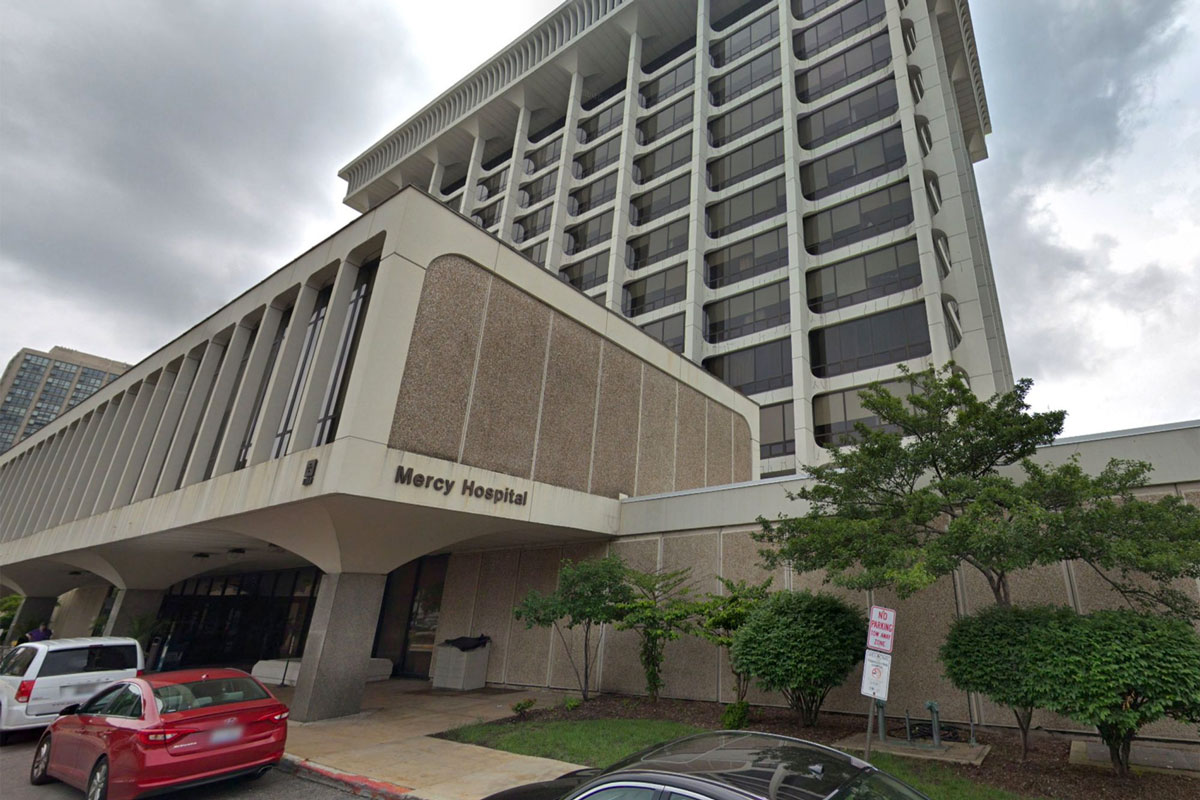 CHICAGO – Mercy Hospital announced plans to close by May 2021 last month, and State Senator Mattie Hunter (D-Chicago) is advocating against it, saying Mercy should remain open.
CHICAGO – Mercy Hospital announced plans to close by May 2021 last month, and State Senator Mattie Hunter (D-Chicago) is advocating against it, saying Mercy should remain open.
“This decision could devastate our community, which is already struggling in the middle of this global pandemic,” Hunter said. “Mercy owners requested hundreds of millions of dollars just to close it down, and turn it into a clinic. But we don’t need a clinic, we need a hospital, which has the resources necessary to save lives in times of urgency and in times of severe illness.”
In March, Mercy announced plans to merge South Shore Hospital, Advocate Trinity Hospital and St. Bernard Hospital, but failed to gain the financial support necessary to do so.
- Details
- Category: Senator Julie A. Morrison News
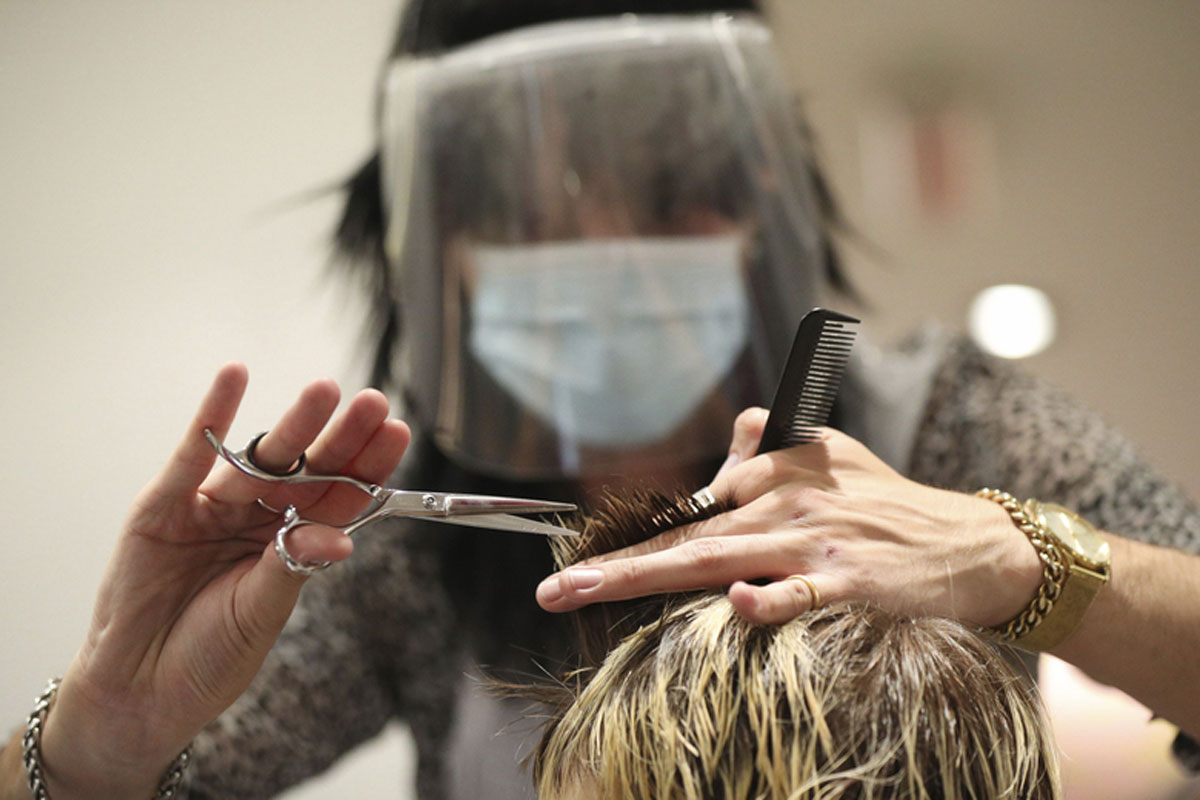 DEERFIELD — As small businesses continue to face financial hardships brought on by the COVID-19 pandemic, State Senator Julie Morrison (D-Lake Forest) is pleased more than 50 businesses throughout her district have received nearly $900,000 in combined assistance through the Business Interruption Grant Program.
DEERFIELD — As small businesses continue to face financial hardships brought on by the COVID-19 pandemic, State Senator Julie Morrison (D-Lake Forest) is pleased more than 50 businesses throughout her district have received nearly $900,000 in combined assistance through the Business Interruption Grant Program.
“The small business community and its hardworking owners hold a special place in my heart, and I’m happy they will receive much-deserved assistance,” Morrison said. “Between being shut down for weeks and the extra cost that comes with keeping employees and customers safe and healthy, these business owners need as much help as we can possibly provide them.”
A total of 53 business in the district Morrison represents received a combined $870,000. Each business received between $10,000 and $20,000 to be used to help with working capital expenses, including payroll costs, rent and utilities. The funds may also be used to cover pandemic-related expenses, such as personal protective equipment, training and new technology.
The Illinois Department of Commerce and Economic Opportunity awarded a total of $46 million to 2,655 small businesses in the first round of BIG funding. The BIG program offers grants to Illinois restaurants and bars, barbershops and salons, and fitness centers that have suffered pandemic-related losses, with a focus on businesses in the hardest-hit areas of the state.
The BIG program is the largest state-run economic support program formed in response to the COVID-19 economic downturn. The full list of grant recipients is available here.
- Details
- Category: Senator Patrick Joyce News
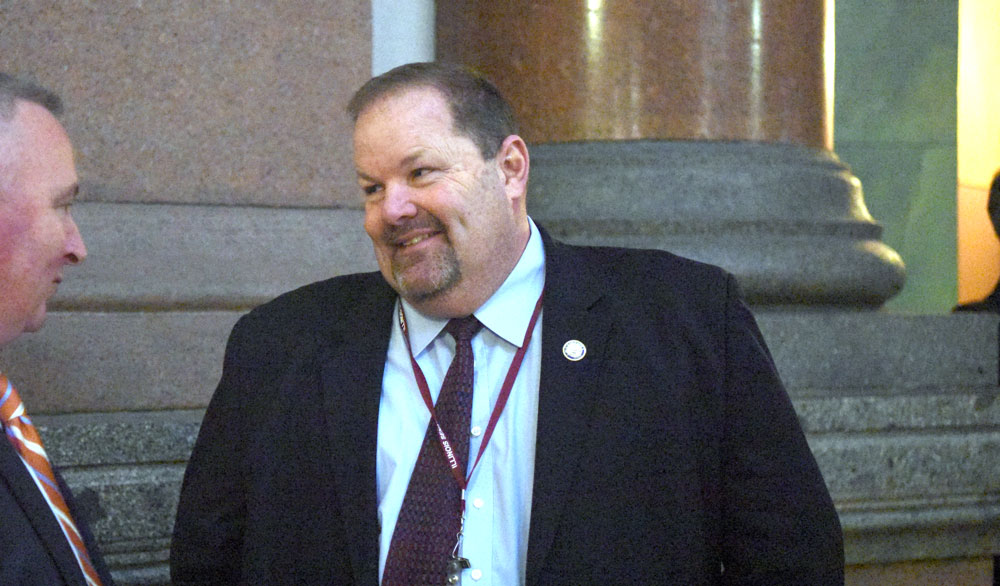 PARK FOREST – As small businesses work to recover from the ongoing coronavirus crisis, State Senator Patrick Joyce (D-Essex) intends to highlight the ways business owners are prioritizing safety for their employees and customers by touring the businesses of the 40th District.
PARK FOREST – As small businesses work to recover from the ongoing coronavirus crisis, State Senator Patrick Joyce (D-Essex) intends to highlight the ways business owners are prioritizing safety for their employees and customers by touring the businesses of the 40th District.
“Small businesses enhance our neighborhoods and stimulate our local economy,” Joyce said. “I look forward to hearing from small business owners, so we can empower and support them as they work to maintain a safe environment and get back on their feet during this awful pandemic.”
Joyce said he hopes to tour restaurants, retail shops and businesses that provide personal services, like spas and salons. All tours will be in compliance with the state’s public health guidelines and restrictions, including wearing a mask and social distancing.
Applications are open, and interested business owners can find the application at http://SenatorPatrickJoyce.com/SmallBusinessTours. Joyce plans to start the program in the coming weeks and requests businesses to submit requests soon. Once the application is received, a member of Joyce’s team will respond with additional details.
Those with questions can contact Joyce’s office at 708-756-0882 or visit SenatorPatrickJoyce.com.
- Details
- Category: Senator Laura Murphy News
 DES PLAINES – Local food pantries will be able to offer fresh, Illinois-grown sweet corn to families in need, thanks to a donation from State Senator Laura Murphy (D-Des Plaines) and the Mercer County Farm Bureau.
DES PLAINES – Local food pantries will be able to offer fresh, Illinois-grown sweet corn to families in need, thanks to a donation from State Senator Laura Murphy (D-Des Plaines) and the Mercer County Farm Bureau.
Murphy hosted a giveaway Monday, where a truck bed full of sweet corn was distributed to local food pantries and other community organizations serving families in the 28th District.
“Especially during tough economic times, it can be challenging for families to afford the fresh, nutritious produce Illinois farmers offer,” said Murphy. “I’m grateful to the Mercer County Farm Bureau for making sure every member of our community can enjoy delicious, locally grown sweet corn.”
Read more: Local food pantries receive hand-picked sweet corn at Murphy giveaway
- Details
- Category: Senator Scott Bennett News
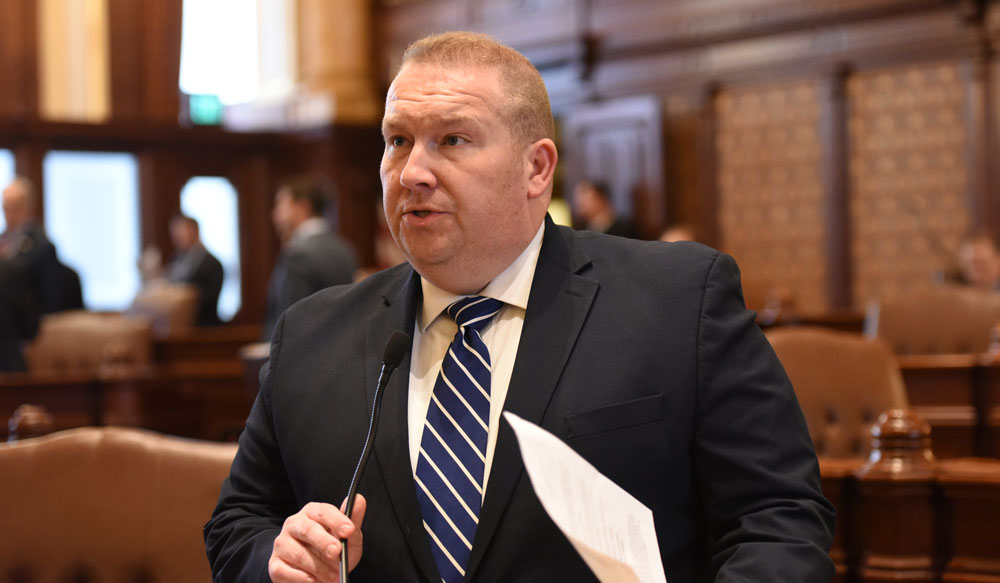 CHAMPAIGN – In an effort to understand and address the impact of the COVID-19 pandemic on local businesses, State Senator Scott Bennett (D-Champaign) launches district-wide tour of businesses across Vermilion and Champaign Counties.
CHAMPAIGN – In an effort to understand and address the impact of the COVID-19 pandemic on local businesses, State Senator Scott Bennett (D-Champaign) launches district-wide tour of businesses across Vermilion and Champaign Counties.
“Small businesses are the heart of our community,” Bennett said. “Some businesses are going above and beyond to ensure the health and safety of their staff and customers, so I want to put a spotlight on those businesses that are working hard to create a safe environment.”
Bennett said he hopes to tour restaurants, retail shops and businesses that provide personal services, like spas and salons. All tours will be in compliance with the state’s public health guidelines and restrictions, including wearing a mask and social distancing.
Applications are available at http://SenatorBennett.com/SmallBusinessTours. Bennett plans to start the program in the coming weeks and requests businesses to submit requests soon. Once the application is received, a member of Bennett’s team will respond with additional details.
“The pandemic has taken its toll on small businesses,” Bennett said. “We need to continue to do all that we can to ensure our businesses have the resources they need to be successful.”
With questions, businesses in Champaign County should call Bennett’s Champaign office at 217-355-5252 and Vermilion County business owners should contact his Danville office at 217-442-5252.
- Details
- Category: Senator Bill Cunningham News
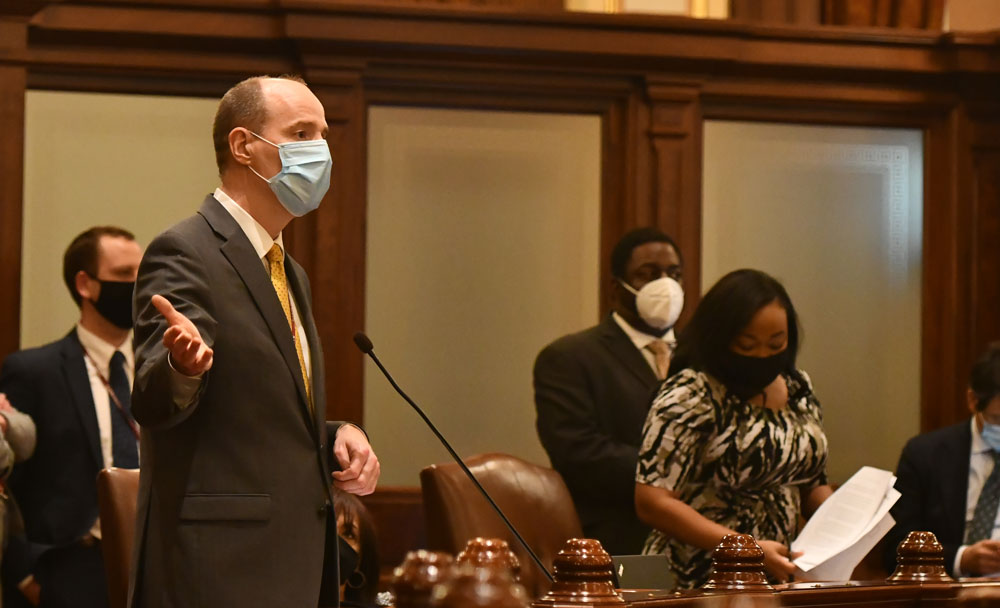 CHICAGO – Businesses in Chicago and the southwest suburbs that have been hit the hardest by COVID-19-related closures and operating changes are set to receive $680,000 in special relief grants, State Senator Bill Cunningham announced today.
CHICAGO – Businesses in Chicago and the southwest suburbs that have been hit the hardest by COVID-19-related closures and operating changes are set to receive $680,000 in special relief grants, State Senator Bill Cunningham announced today.
“This Business Interruption Grant program is so important for small businesses that have done everything right by putting the health and safety of their customers and employees first during this pandemic,” said Cunningham, a Democrat who represents portions of Chicago and the southwest suburbs. “I’m hopeful this first round of grants will help the businesses that make our communities unique.”
The grants are the first round of the Business Interruption Grant (BIG) program. The state program will award these grants to a variety of businesses, with top priority to those hit hardest by the COVID-19 pandemic.
The grants are distributed in awards of $10,000 or $20,000 and can be used to help businesses with expenses like payroll costs, rent, utilities, equipment and other possible unexpected costs to relieve the effects of the pandemic, such as PPE, training, and new technology.
“This pandemic has hit small retailers, independently-owned gyms, and hospitality businesses like bars and restaurants especially hard,” Cunningham said. “That’s why the program is ensuring that these businesses are the priority when grants are being awarded.”
- Details
- Category: Senator Celina Villanueva News
 CHICAGO – The state released $46 million in Business Interruption Grants to more than 2,500 local businesses in the first round of the program, which is intended to help businesses hit especially hard by pandemic-related closures and restrictions. State Senator Celina Villanueva (D-Chicago) is urging more business owners to apply for the next round.
CHICAGO – The state released $46 million in Business Interruption Grants to more than 2,500 local businesses in the first round of the program, which is intended to help businesses hit especially hard by pandemic-related closures and restrictions. State Senator Celina Villanueva (D-Chicago) is urging more business owners to apply for the next round.
“I was happy to see more than 50% of this round of grants go to businesses owned by people of color in particularly hard hit areas,” Villanueva said. “These grants will go a long way to help businesses struggling from the COVID-19 outbreak, especially for the many business owners who couldn’t qualify for federal aid in communities like the one I represent.”
In the 11th Senate District, 42 businesses received $770,000 in aid. First round BIG grants range from $10,000 to $20,000 and will be used to help businesses cover payroll costs, rent and utilities. The funds may also be used to cover pandemic-related expenses, such as masks and other protective equipment, training, and new technology. Recipients were selected via a random lottery.
Before the next round of grants, the Department of Commerce and Economic Opportunity is providing technical assistance to support entrepreneurs who need help applying, especially in communities of colors. They will work through community partners, including the Illinois Business Immigration Coalition, The Resurrection Project, and the Chicago Urban League.
“We all know the truth is the pandemic has hit Latinx and Black communities especially hard, especially in the city,” Villanueva said. “Businesses in our communities often have less resources and less experience navigating government programs. I urge local businesses who need help to work with these community navigators to apply for the next round of grants.”
DCEO expects to launch the next round of applications soon.
More Articles …
- Joyce commends area businesses receiving recovery grants
- Bennett highlights local businesses selected to receive Business Interruption Grants
- DuPage and Will county small businesses to receive over $500,000 in pandemic relief grants
- Bennett highlights local businesses selected to receive Business Interruption Grants
Page 617 of 743












 © 2025 Illinois Senate Democratic Caucus
© 2025 Illinois Senate Democratic Caucus